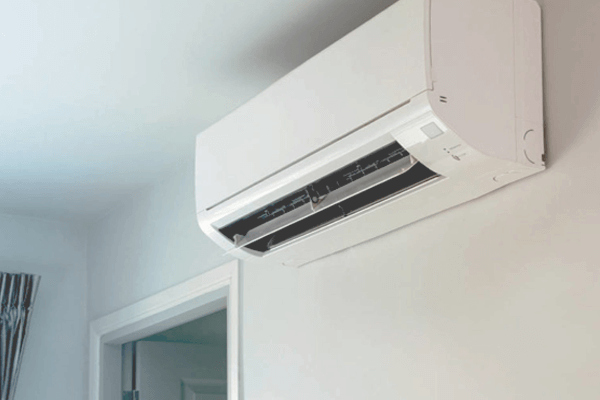Are you confused about the nitty-gritty of getting new air conditioning units into your home? Granted, the multitude of choices available can be daunting, right from the mini splits and full ducts to swamp coolers and portable units.
Whether you live in the smallest apartments or the grandest mansion (or anything in between), Anderson Air has your back! To help you untangle the knots, we decided to create an adequately detailed guide to picking out the best option that suits you and your home’s needs.

Types of Home Air Conditioning Systems
Ducted central-air systems
These home air conditioning systems use ducts to blow cool air blasts evenly throughout your home, enabling you to easily regulate your entire home’s temperature. Even though they take up a lot of space, they’re pretty discreet. They are as efficient and durable as possible, which translates to value for money and notable energy saving.
However, ductwork installation can be significantly expensive since it requires extensive work that can only be carried out by a licensed professional. This system is pricey but could bring value to your home, which most professionals agree with.
Mini-split/ductless systems
Ductless systems involve installing individual blowers around a home’s perimeter for each air-conditioned space (plus equivalent units on the interior walls), making them very visible. These are way more efficient because they don’t dissipate energy as the air travels through them. This system is an excellent fit for folks who intend to invest in a comprehensive cooling system but want to avoid spending on ductwork.
While they’re more affordable than ducted central-air units and can deliver close to 20 years of reliable service, they’re still vast and complex; we strongly recommend hiring a licensed HVAC professional to ensure a neat and seamless installation.
Window air conditioners
These are ideal home air conditioning systems for those homeowners looking to cool one room at a time. Depending on your house size, the cost of each air conditioning unit and the elevated electric bill could amount to a hefty sum. With that in mind, they are pretty easy to install and don’t necessitate a professional as they have a DIY element. (All you’ll need is a proper drill, a screwdriver, measuring tape, and a level, not forgetting insulating foam side panels.)
Portable air conditioners
These are perfect for spaces without windows or for those homeowners who might need to be able to rotate their air conditioning units between rooms. Experts here at Anderson Air agree that they are the comfortable option to add to your home because they have the most effortless installation, are readily available, and are easy to move from one room to another.
Evaporative/swamp coolers
Like portable air conditioners, swamp coolers are also cheap, notably energy-efficient, and have an insignificant environmental impact. These home air conditioning systems (units) are most suitable for hot, arid climates since their cooling system works by adding moisture into the air.
How to know the correct type of Air conditioner for you
If you’re thinking about getting a window unit, search for one that has enough power to chill your home/room but isn’t too huge for your preferred window. If the unit is too small for the room, it will fail to adequately chill it, whereas a unit that is too large for the space will result in excessive air dryness. A 300-square-foot room often needs a minimum of 7,000 BTUs to keep a comfortable indoor atmosphere, while a 1,000-square-foot space requires a minimum of 18,000 BTUs. You ought to consult an HVAC specialist for advice.
Be sure to install the air conditioning units where you know people always spend the most time during the daytime, and if you live in hot and humid climates, it’s more important to install where you know people sleep at night. A portable Air conditioner is a safe option to rotate between rooms day and night.
Factors to consider before you purchase a window A/C unit
- Find out whether your window is compatible with your home air conditioning units. Several AC units only fit in either single- or double-hung windows with sashes that you can raise and lower to allow ventilation.
- Confirm that the window you intend to use is next to a three-prong outlet, and If you don’t have one, you’ll need an extension cord. Using a dedicated circuit to avoid anyone tripping a breaker or a fuse getting blown is safer.
- Clear all obstructions that might interfere with the Air Conditioning unit, such as screen or storm window frames.
- Determine if you’ll need extra insulation and rain protection and exactly how much you’ll need to add around the window. You could seal all gaps between the sashes and sides of the Air Conditioner with foam.
- Home air conditioning units need to be placed in a shaded or partially shaded window as direct sunlight decreases the AC unit’s efficiency while getting hit by hot air. The window of choice should also be free of any furniture or other obstructions inside or outside the room/space to ensure adequate airflow. Please take note of the direction your window faces.
Frequent mistakes to avoid
- Do you know the one frequent mistake A/C shoppers regularly make? Ignoring the efficiency of the unit. We, the team at Anderson Air, insist that before you purchase that AC unit, you must read the Seasonal Energy Efficiency Ratio (SEER) rating of that particular product to determine how efficient the unit is to avoid buying a less than average efficient system.
- Whatever option you decide to go with, placement is paramount. Your Air conditioning unit will fail to work if you do not position it strategically next to the thermostat, as this will cause inconsistent temperatures within the house. This poor positioning can directly limit the power and efficiency of the AC unit.
Conclusion
While you’re eager to get your house air-conditioned, the attention to every detail necessary for its installation should be keen to ensure the proper function of the AC unit and its longevity. If any of this looks like rocket science, feel free to reach out to a professional HVAC company to assist in installation.
